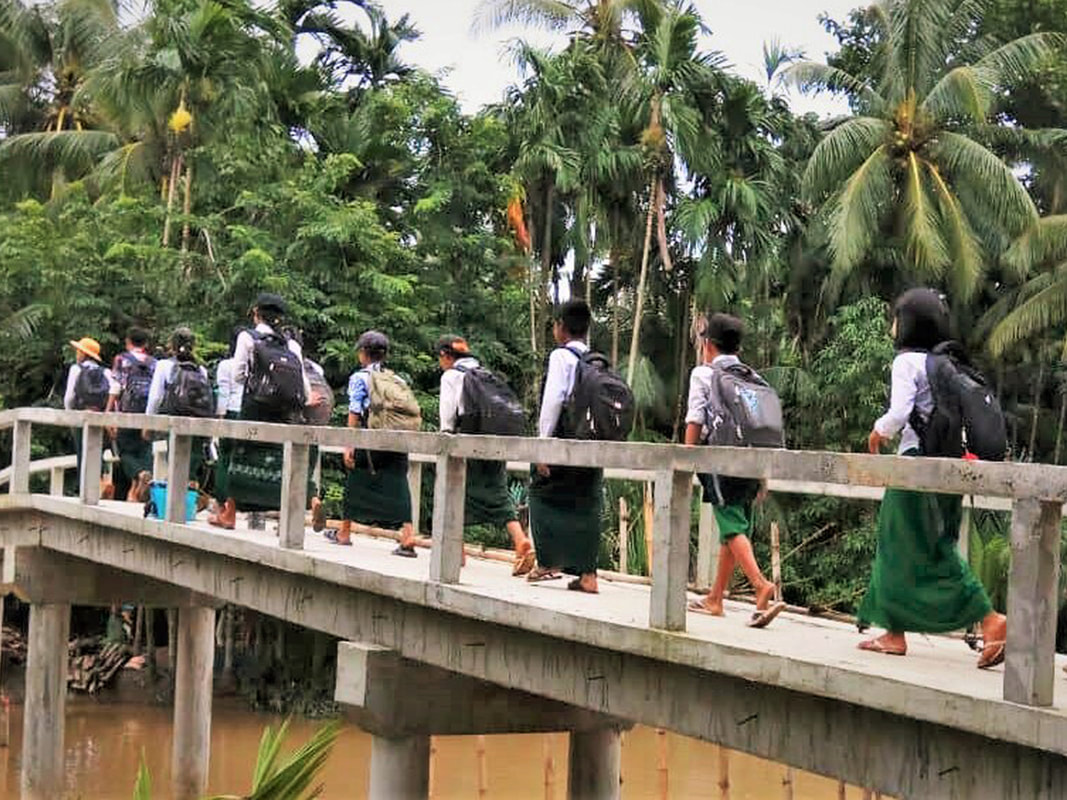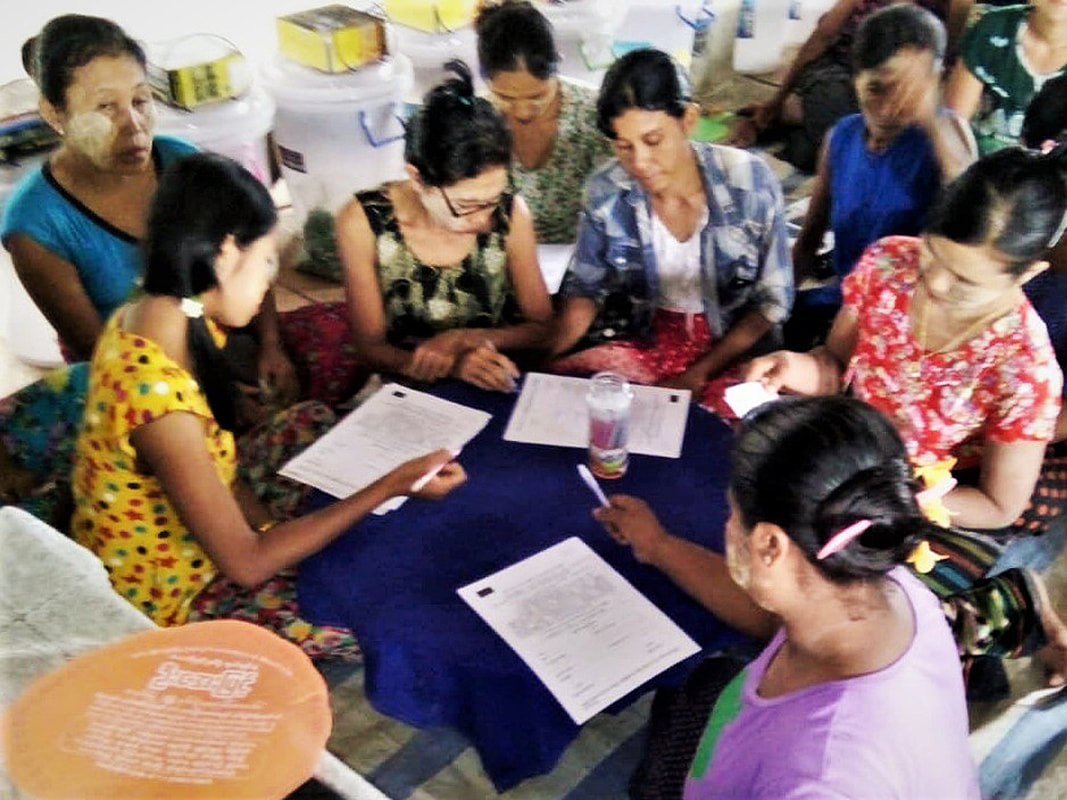|
With support from a private donor, Community Partners International (CPI) is working to support 568 households (over 2,200 people) in five villages in Mawlamyinegyun township, Ayeryawady Region, to address the challenges they face and improve their living conditions. The Better Homes Better Lives (BHBL) Project is a partnership between CPI and local partner Baythitsadarna, a community-based organization linked to a monastery in Mawlamyinegyun. Mawlamyinegyun lies in the Ayeryawady Delta region in the south west of Myanmar. It is a low-lying and predominantly rural region, where agriculture and aquaculture are important sources of livelihoods. It is the delta for Myanmar’s largest river, the Ayeyarwady, whose vast waters drain through a complex network of waterways that criss-cross the region and ultimately discharge into the Indian Ocean and the Gulf of Martaban. As a low-lying coastal region, Ayeyarwady Region is vulnerable to cyclones, storm surges and flooding. CPI and Baythitsadarna have worked together for several years on community maternal and child health services. For this new pilot project, CPI and Baythitsadarna consulted with communities around Mawlamyinegyun to identify and prioritize their needs. The communities identified a range of priorities that encompassed health, water, sanitation and hygiene, education, lighting and community infrastructure. During the consultation, community members proposed to create women-led teams to act as the focal point and lead for community improvements. Under the project model, CPI will train and mentor these women-led teams in each village to become peer educators and to oversee the roll-out of local improvement projects. These teams have now been established in five villages in Mawlamyineguyn Township. In the longer term, CPI plans to train these teams in key aspects of reproductive health, family planning, sanitation and hygiene, disease awareness and nutrition so they can act as a community resource for health education. One key community concern centered on clean water. At present, community members draw water from a nearby creek. The water is not purified and children quite frequently suffer from diarrhea. CPI partnered with Thirst-Aid, a Myanmar-based organization that focuses on clean water and hygiene, to supply ceramic water filtration units to households in five villages. Thirst-Aid’s water filters are locally produced and designed for optimal ease of use and maintenance. They consist of a tailor-made ceramic filtration bowl that sits inside the rim of a commonly-available lidded plastic container with a tap installed at its base. Users pour unfiltered water into the ceramic bowl at the top which filters the water as it slowly passes through it. The filtered water drops into the plastic container ready to drink. In April 2018, Thirst-Aid traveled to Mawlamyinegyun to distribute the first 176 filters and train community members on filter correct use and maintenance and good hygiene practices. Many households in Mawlamyinegyun do not have regular access to electricity. At night, they depend on small battery-powered lamps for light. However, the batteries in these lamps need to be frequently recharged, a service offered locally at a cost of 100 kyats per light. Many households struggle to afford this and so minimize usage. The lack of household lighting at night can impact families in many ways, particularly schoolchildren who need light to complete their homework in the evening. CPI distributed 250 solar-powered lamps to households in five villages. These lamps provide a free source of light all year round. Another aspect of improvement identified with the community was cooking practices. At present, most households use the traditional ‘Three Stone’ cooking method, essentially an open fire with three large stones to support cooking pots. These fires emit large quantities of smoke, and have been shown to be major contributors to respiratory diseases, particularly when used in enclosed spaces. CPI showed community members a model of cookstove that is much cleaner, safer and more efficient than the ‘Three Stone’ cooking method. Having inspected the stove, community members agreed that they would like to make the switch. CPI has placed an order with a local supplier in Myanmar for 200 cookstoves and will distribute them to households in five villages in Mawlamyinegyun township in July 2018. To help empower community ownership, engagement and greater sustainability, CPI proposed a cost-share model though which both CPI and the community would support the costs for the filtration units, solar lights and cookstoves. Community members agreed and offered to support 50% of the cost. CPI also supported the construction of a concrete footbridge at Kyaw Nu village. This bridge is strategically located to better connect four villages in the surrounding area to each other, and nearby towns. Without the bridge, it can be difficult and costly for people to travel, particularly for schoolchildren who need to regularly cross the river to attend school. During the monsoon season, the crossing can become dangerous as the river swells. The bridge was completed in early May, 2018, and now people and goods can easily and safely cross the river. The bridge is also helping villages to transport agricultural equipment between villages for their farming needs. Community members also identified various needs in the monastic schools that serve the villages in this part of Mawlamyinegyun Township, ranging from hygiene and sanitation, school equipment and teacher support. CPI is working with several monastic schools on a range of improvement projects including the construction of additional latrines, handwashing and bathing stations, and additional benches and chairs for classrooms. CPI is focusing on using local tradesmen, laborers and suppliers to ensure maximum support for the local economy. CPI is supporting the recruitment of additional teachers to help alleviate severe understaffing challenges in these schools, and to supply a wider range of learning materials. CPI is also working with these communities to support and develop livelihoods. CPI is planning to develop pilot projects, beginning in August 2018, for breeding poultry and cultivating mushrooms with support from a local monastery.
On the basis of the outcomes of this pilot project, CPI will look to extend activities in Mawlamyinegyun to support more communities to improve their living conditions. Comments are closed.
|
AuthorCPI Admin Archives
July 2024
Categories
All
|
|
|
COMMUNITY PARTNERS INTERNATIONAL
580 California St Fl 16, Ste 1658, San Francisco, CA 94104-1068, USA [email protected] +1 510 225 9676 We are a registered nonprofit 501(c)(3) Public Charity. TAX ID 94-3375666 |
©
Community Partners International



 RSS Feed
RSS Feed
